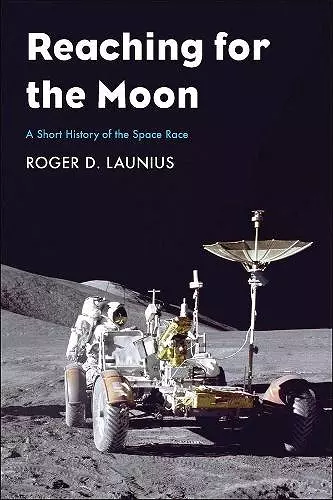Reaching for the Moon
A Short History of the Space Race
Format:Hardback
Publisher:Yale University Press
Published:9th Jul '19
Should be back in stock very soon

Fifty years after the Moon landing, a new history of the space race explores the lives of both Soviet and American engineers
At the dawn of the space age, technological breakthroughs in Earth orbit flight were both breathtaking feats of ingenuity and disturbances to a delicate global balance of power. In this short book, aerospace historian Roger D. Launius concisely and engagingly explores the driving force of this era: the race to the Moon. Beginning with the launch of Sputnik 1 in October 1957 and closing with the end of the Apollo program in 1972, Launius examines how early space exploration blurred the lines between military and civilian activities, and how key actions led to space firsts as well as crushing failures.
Launius places American and Soviet programs on equal footing—following American aerospace engineers Wernher von Braun and Robert Gilruth, their Soviet counterparts Sergei Korolev and Valentin Glushko, and astronaut Buzz Aldrin and cosmonaut Alexei Leonov—to highlight key actions that led to various successes, failures, and ultimately the American Moon landing.
“Launius skilfully integrates diferent aspects and perspectives and explains the complexities of the moon race, its roots, and outcomes in an exceptionally readable and easily understandable form, which makes the book a fascinating read not only for historians but also for a broad audience interested in space history.” – Darina Volf, Minerva
“By giving Soviets equal time in the portrayal of the space race, Launius makes a real contribution to our understanding of the forces that motivated Americans to reach for the Moon.”—Howard McCurdy, American University
“An important, short book that is not simply a chronology of the Moon Race but a meditation on the reasons for the success of Apollo and an exploration of its legacy.”— Asif Siddiqi, Fordham University
"Twelve people, all Americans, walked on the lunar surface between 1969 and 1972. In this concise but authoritative account, Roger Launius tells us how the U.S. beat the Soviet Union to the Moon, and reflects on the lasting significance of that remarkable success."—John M. Logsdon, author of John F. Kennedy and the Race to the Moon
“Roger Launius’s keen analysis penetrates the stale metanarrative that for the past five decades has dominated—and, in key respects, misled—our understanding of the American and Soviet space programs. More than a great read, it is a must read for anyone interested in the fascinating but overly mythologized story of the Moon race.”—James R. Hansen, author of the New York Times Bestseller First Man: The Life of Neil A. Armstrong
ISBN: 9780300230468
Dimensions: 210mm x 140mm x 24mm
Weight: unknown
256 pages